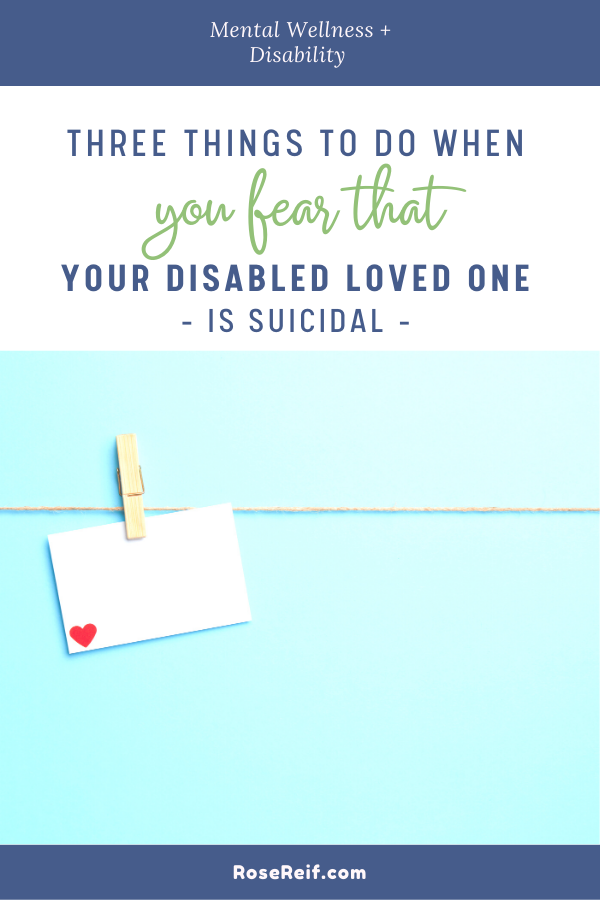It’s understandable that you might have this fear.
Depression rates are significantly higher among people who have acquired a disability.
Studies like this one and this one have found that suicide rates are higher among people with acquired disabilities such as multiple sclerosis and spinal cord injury than they are among the general population.
And perhaps now more than ever, during the Coronavirus pandemic, the quality and value of life of people with certain disabilities is being questioned.
As a counselor who helps people with disabilities and the people who love them, I often talk with my counseling clients who are caregivers about their fears that their loved one may attempt suicide.
Here are three things you should do immediately if you fear that your disabled loved one is suicidal.

Ask.
Talking about suicide is difficult. But avoiding talking about suicide is dangerous. By asking and talking explicitly about suicide, you help your loved one overcome the shame and difficulty of having to start the conversation. You take away some of the stigma associated with having suicidal thoughts.
When you talk to your loved one, it’s important that you use clear, concrete language to ask the question that you really want to know the answer to. This might be:
- Are you thinking of ending your life?, or
- Are you considering suicide?
If you ask a more ambiguous question, you may not get the full picture.
For example, suppose you suspect that your disabled loved one is suicidal. You ask “are you thinking of hurting yourself”? They may truthfully answer “no”. Because to a person in extreme psychological or physical pain, suicide isn’t a way of hurting themselves. To this person, dying by suicide would be a relief from their pain.
If the person responds to your direct question about suicide by confirming that, yes, they have considered ending their life, it is important that you respond in a way that encourages them to talk more about their feelings and thoughts.
Because your first (understandable) instinct may be to say
“But you have so much to live for”, or
“You can’t be serious”, or
“How could you hurt me like that?”, or
“Don’t say that”
These responses reflect your own anxiety, and your desire to help your disabled loved one see the positive aspects of their life. But they sound horribly invalidating to a person who genuinely believes that they should not be alive.
When someone tells you they are considering suicide, what you truly must do is aim to understand them.
Here again it is important to ask questions that invite them to share their thoughts and feelings. You might ask questions like:
- “What is making you want to die?”
- “Have you thought about how you might end your life?”
- “When do you think you might act on your thoughts of suicide?”
Once you have asked these and other questions that reflect your care and desire to understand, you are ready to do the most helpful thing you can do when your disabled loved one is suicidal.
Listen.
The movie trope of ‘talking someone down off the ledge’ would make you believe that, if your disabled loved one is suicidal, your job is to say something.
Something profound, something that inspires hope. Something that reminds them of all there is to live for.
But this is not true.
If your disabled loved one is suicidal, the best thing you can do is listen to them.
You are not listening to try to fix their problems. It is not necessary for you to offer advice, or to point out what they have to be grateful for.
What you must do is simpler. Well, simpler to explain, but exponentially harder to do. You must listen with your only goal being to truly understand the depth of their pain. Remember that you don’t have to agree with it, but you must fully understand it.
You may be surprised by what you learn. Many people suppose that it’s the changes to a disabled person’s daily routines that might cause them to consider suicide. Using a wheelchair or an augmentative communication device, or requiring assistance with showering or cooking, are the reasons that many non-disabled people believe that a disabled person might not want to live. But articles like this one support that disabled people typically cite changes to their relationships and sense of self-worth as a reasons for their depression and suicidal thoughts. These factors are more often at the root of suicidal thoughts than are the assistive devices and lifestyle changes required due to a person’s disability.
Listening for these themes, you’ll be able to reflect back to your loved one why they feel that ending their life seems like the right thing for them to do. From this place of compassionate understanding, you can move on to the next essential task to care for your disabled loved one who is suicidal.
Act.
If your disabled loved one is suicidal, it’s important that you help them get the help that they need.
Start by telling them why you want to help:
“I care about you, and I would be sad if you ended your life. I’m so glad that you’ve told me how you’re feeling, and I want to help you feel better.”
In the United States, they can call the National Suicide Prevention Lifeline (800) 273-8255) or text the Crisis Text Line (741-741).
You can also help them connect with a therapist or psychiatrist who they are already working with.
If you feel that they are at immediate risk of acting on their suicidal thoughts, call 911 or take them to the nearest Emergency Department.
Additional resources
Of course, I sincerely hope that you never know the pain and anxiety of realizing that your disabled loved one is suicidal.
But if you do, I hope that you find helpful information in this post.
Here are two additional resources that you may find helpful as you continue to support your disabled loved one who is considering suicide.
Speaking of Suicide, a fantastic site to find additional resources and support.
Keep reading
Other posts you may be interested in
Eight Tips to End Your Marriage with Dignity After Your Spouse Becomes Disabled
When your spouse becomes disabled, your whole world changes in an instant. The plans you’d made for the future all crumble away. Suddenly, your life feels like an endless stream of doctor’s appointments and therapy groups. It may feel like you know longer really know...











